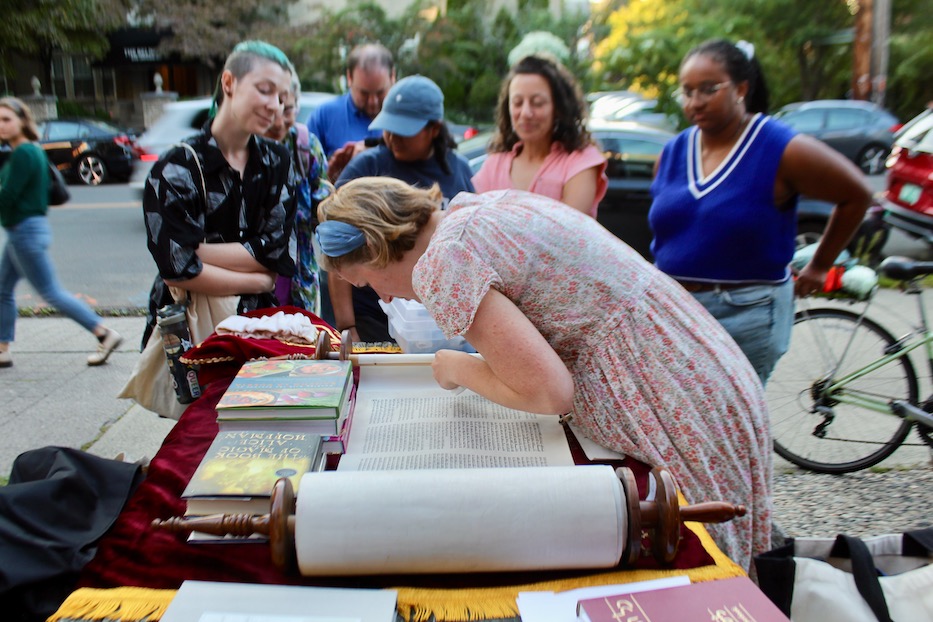
Culture & Community | East Rock | Faith & Spirituality | Arts & Culture
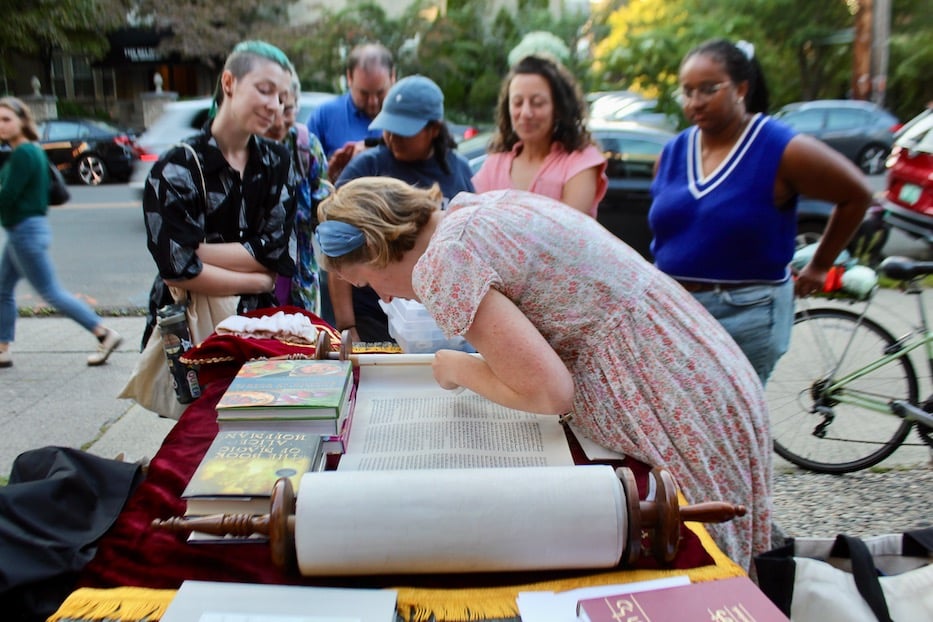
Soferet Stephanie Breitsman. Lucy Gellman Photos.
Stephanie Breitsman leaned over a Torah scroll atop a picnic table on Orange Street, scanning the words to Bereishit, or the beginning of the world. Around her, three generations of New Haveners craned their necks to study each movement, the youngest gumming an ear of corn as they watched. Beyond the curb, evening traffic whirred by, cyclists slowing down every so often to get a look. Breitsman placed a scalpel to the parchment, and made a careful, tiny movement.
On the cusp of the High Holidays, on the first day of creation, on a sun-splattered sidewalk just after rush hour, it felt like exactly the right place to start.
Breitsman, who is among a handful of progressive Jewish scribes in the U.S. and across the globe, arrived in East Rock last week to repair and dedicate a Torah for Mending Minyan, a non-Zionist, LGBTQ+ inclusive, anti-racist, -ism and -obia bucking havurah that has been steadily growing in New Haven for the past five years. Led by Rabbi May Ye and members of the congregation, the group seeks to decouple Judaism from Zionism, in what may be part of an open question that more American Jews have been asking in the past decade.
For years, it has operated without a Torah of its own, using borrowed scrolls during its High Holiday services each year. This year, it received an offer from a minyan in Philadelphia that was closing down, with one caveat—it would need a repair. Both Ye and Breitsman, who met during their years at the Reconstructionist Rabbinical College in Pennsylvania, jumped at the opportunity.
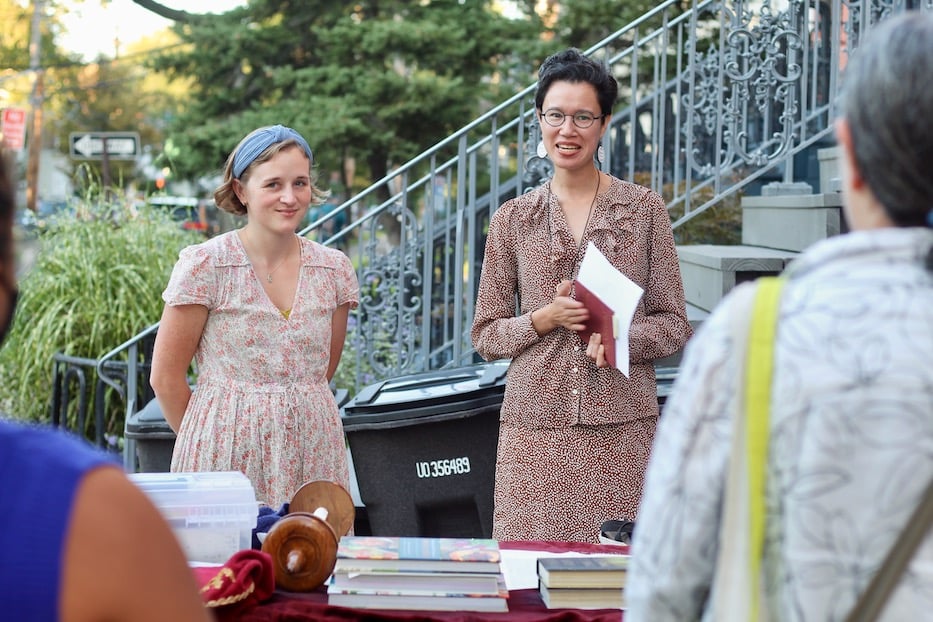
"This is a miracle," said Ye, her face sunlit as a large pomegranate charm hung from her neck. "I want to say 'a dream come true,' but I didn't even know that this was a possibility. This feels like a tikkun, like a repair, that an explicitly non-Zionist, anti-Zionist, diasporist congregation has our own sacred Torah. I think this is a message to the world—that we too are Jews. That we deserve and have the right to sacred objects."
It was so that the two found themselves drenched in sunlight on Orange Street, surrounded by members of Mending Minyan who ranged from nine months old to well into their 70s. As attendees caught up with each other, conversation rising and falling around the table, Breitsman set out pens, a quill and black gall seed ink, erasers, and a surgical-grade scalpel, all "for clearing things up," she said. It was a Tuesday; she knew that by the weekend, it would be in use for Rosh Hashanah services.
Gently, she secured the scroll with stacks of books, photographs of bright radishes and green tomatoes peeking out from the cover of Rancho La Puerta and the cookbooks beneath it. Beside it, Alice Hoffman's The Book of Magic almost glowed gold in the evening light.
"Shall we begin?" asked Ye, and as if on cue, attendees gravitated towards the table, some straightening their backs to get a glimpse of the scroll. Around her, longtime members of the havurah wound back the clock to 2018, and began to remember the five-year journey it has taken to get a Torah that belongs solely to the group, without requirements or a date by which it must be returned.
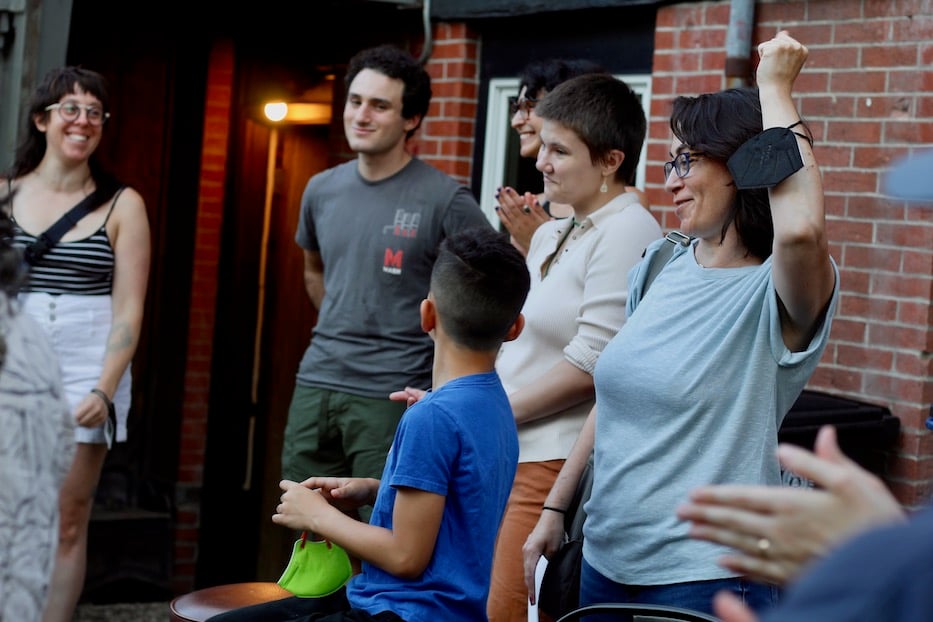
That road began in 2018, when New Havener Mikveh Warshaw and fellow founding members of Mending Minyan planned the havurah's first High Holiday services at the Palestine Museum, then newly opened to the public in a business park in Woodbridge. That year, during which services were entirely lay-led, the Torah came from the Reconstructionist Rabbinical College outside Philadelphia, from which Ye would later graduate and move to New Haven.
At the time, it was just a grassroots group of Jews who didn’t feel at home in other congregations. There was no telling that it would stick, and grow to include dozens of Jews who practiced ritual in backyards, living rooms, public parks and art museums.
In the following years, there were multiple congregations and groups willing to lend out their scrolls, as well as pandemic interruptions that pushed services temporarily online. In 2021, a Torah came from the Jewish teen group BBYO, an active chapter of which meets in Woodbridge. Then last fall, one of Ye's classmates drove a scroll from Philadelphia to Queens, where member Rebecca Cohen picked it up and brought it to New Haven. With a smile, she remembered it as "the great Torah relay" that made the High Holidays possible that fall.
All of those years have been great blessings, Ye said—but there is something specific about the havurah having its own Torah. The sacred scroll isn't just used for the High Holidays—it's used for b'nai mitzvot, baby namings, Shabbat services, and rites and rituals all year round. In its best iteration, she said, it is the thing that survives from one generation of worshippers to the next, a symbol of the knowledge, customs, and shared community passed down in a ritual space. Or as Cohen said, "this will, God willing, carry us through generations."
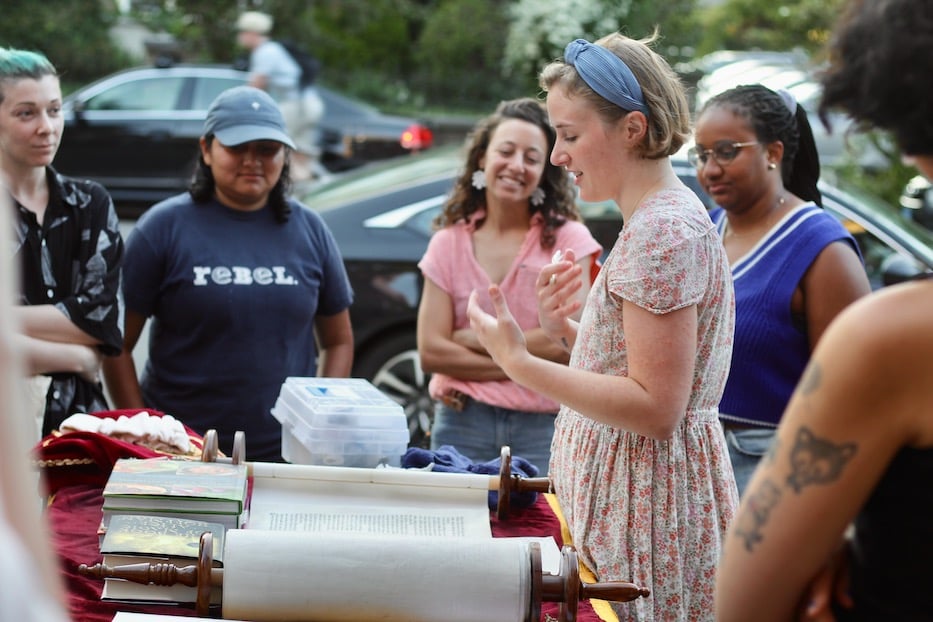
As attendees watched, Breitsman methodically described each step, from making sure each letter is whole, or of "a single body," to the words she says out loud as she is making repairs on the parchment to the intention she sets beforehand. As one in a small but growing number of soferit—women scribes—she added that the explanation is as important to her as the work itself.
"It's been gatekept for a long time," she said, putting scalpel to scroll as though she was performing surgery. "Non-cis men have traditionally not been allowed to practice soferit."
In the honeyed light, she worked meticulously, scraping off the flaking letters of Bereishit before patting them gently with a damp paper towel (in an interview before the repair, Breitsman said that one of the things that delights her is the role of everyday objects, like paper towels and school-grade erasers, in such a holy and guarded process).
She leaned back, her hands fluttering around as she explained the next step, and motioned to a small bottle of gall seed ink. Then she leaned forward with a quill, and gently repaired the letters, saying each word out loud. Around the table, it was quiet enough to hear a pin drop.
"Let's just sing and recognize the blessing," Ye said after she had finished, leading the group in "Kol Haneshamah." Dusk was just beginning to fall over Orange Street, the sky covered in streaks of blue and pink. After blessings thanking both Breitsman and the Torah itself, Ye asked if members wanted to add a few words that sprang to mind.
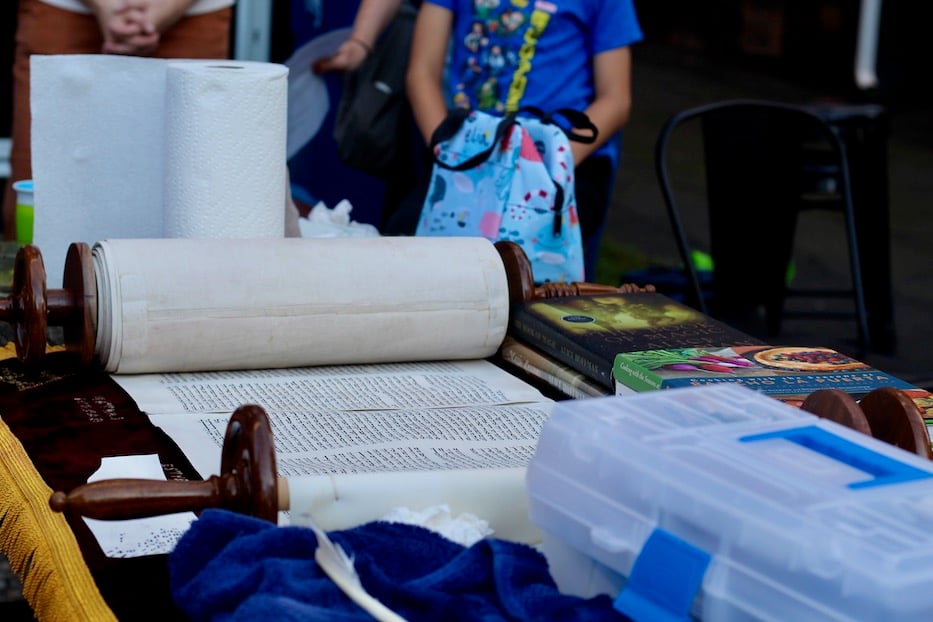
"Community!" ventured fellow Mending Minyan reporter Brian Zahn. "New learning! New sacredness! New hands to hold!."
"It's a grounding," chimed in Diane Litwin. Beside her, Eira Lipkin nodded. "It definitely feels like a long time coming."
"It's the repair of Bereishit—repairing the whole system," Breitsman said. In the street, a driver sped by with the windows open, blasting Nirvana. It doubled as a sudden reminder that members were out in the open, celebrating their Torah on the sidewalk for the neighborhood to see. Across the table, Abi Tischler smiled before she spoke.
"Both the simplicity and the complexity," she said, and for just a moment, her voice wavered. "The challenges and the joys ... those that have been shared by our ancestors."
Closer to the scroll itself, Mending Minyan member Hallie Voulgaris looked at the Toah, a sense of wonder in their eyes. A graduate student in the Department of Music at Yale, where they study Medieval manuscripts and music theory, Voulgaris described themselves as "totally geeking out" by the meeting of past and present that the repair represented.
"I think a lot about people and how they relate to objects," they said. "This—it's a thing I never thought I would get this close to."
It was only sitting with the Torah afterwards, watching the ink dry in the warm evening, that Ye and Breitsman made another discovery that delighted them. In the Hebrew calendar, last Tuesday—at least, before sundown, Ye said—marked the 25th Day of Elul, or the first day of creation.
"It feels beshert [fate] that we repaired the beginning of Bereishit in this new Torah on the anniversary of creation," Breitsman said.
"We're in a season of sweetness right now," Ye had said earlier in the evening, and the words stuck. "A season where we dip apples in honey, where we eat sweet foods. And I just want to note how sweet this is. Torah means teaching. I want to express gratitude for the sweetness of this teaching."

